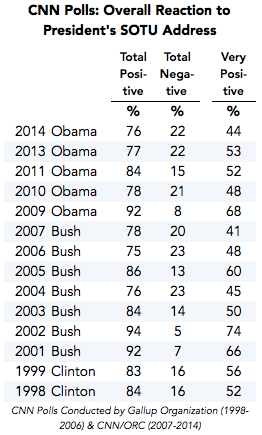WASHINGTON -- Americans who watched President Barack Obama's State of the Union address largely approved, giving him better marks than they did for last year's speech, according to instant polling conducted by CNN.
Positive ratings from State of the Union watchers are the rule, not the exception. CNN found Obama getting high marks in all five annual State of the Union speeches they previously polled (the network didn't conduct a post-State of the Union poll in 2012). Former presidents George W. Bush and Bill Clinton also received largely positive ratings.
Eighty-one percent of viewers had a somewhat positive or very positive opinion of the 2015 State of the Union, according to CNN -- up from 76 percent in 2014, and in line with ratings for Obama's speeches in 2011 and 2013.
The speech also increased watchers' confidence the president's policies "will move the country in the right direction." The number of those saying that rose 15 percentage points, from 57 percent in a pre-speech survey among speech watchers to 72 percent afterward. That was similar to Obama's 17-point gain on the same measure last year.

The opinions of State of the Union watchers don't represent the view of Americans as a whole. Democrats are far more likely than Republicans to watch Obama's speeches, as Republicans were more inclined to watch during the Bush administration.
Most Americans don't watch even parts of the State of the Union address, and it has proven unlikely to affect presidential approval ratings.
Obama devoted much of his speech to what he referred to as "middle-class economics," advocating policies including a raise in the minimum wage, a change in tax policy to cut "giveaways [for] the superrich," and guaranteed paid sick leave and paid maternity leave. In a poll last year, 44 percent of Americans thought of themselves as middle class, while 40 percent called themselves lower-middle or lower class, and 15 percent called themselves upper-middle or upper class.
Voters in the 2014 election largely supported the idea of a minimum wage hike, and, regardless of party, largely agreed that income inequality was increasing. But partisans divided over the importance of the issue: Democrats were 56 percentage points more likely than Republicans to say the minimum wage was somewhat or very important, and 45 points more likely to say income inequality didn't get enough attention.
There's also a partisan fracture on views of the economy, with Democrats significantly more likely than Republicans to give good ratings to the nation's current economic fortunes.

